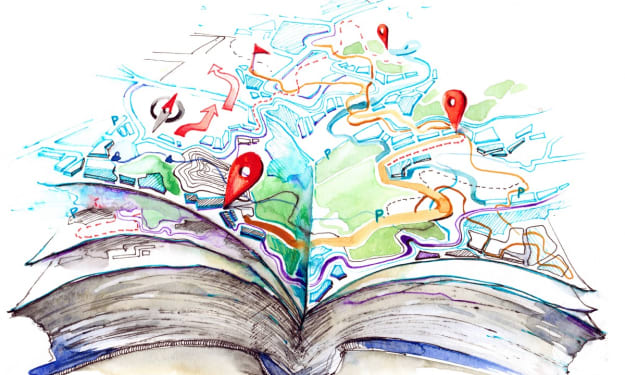Do You Have a Goal When Writing Poetry?
As poets, we ask a lot of questions. If we set a goal when we write, our poetry can become a lot more powerful.

“Tell me, what is it you plan to do
with your one wild and precious life?”
― Mary Oliver
How often do you mindfully sit down to write something with a goal in mind? Are you acting on an idea? Or are you purposefully working toward a specific goal?
The latter is more common for fiction among most of us, but it’s possible to write poetry with an overarching goal in mind as well. In a world where it's hard to get eyes on your poetry, writing with a strategy in mind can help your work stand out.
If want to write poetry that packs a punch, there’s a big audience out there to appreciate your words. In 2017, the US National Endowment for the Arts reported that nearly 28 million adults are reading poetry.
A few years ago, one of my favorite poets on Instagram, Chelsie Diane, aligned her empowering and motivational poetry under the goal of empowering women. I’ve been reading her work for over three years now and so many of her pieces found new and unique ways to capture that feeling.
Seeing her publicly set a goal for her poetry started to make me think. Is there any kind of unity in my poetry? I’m writing, but what exactly is my goal?
When you write a poem, do you have a specific goal in mind?

If you’re ever worried that a poem you wrote doesn’t pack enough of a punch, this is a good question to ask.
Start small. Before you decide to align your poetry toward a specific goal, look at specific poems. Reread them ask yourself what the key thing you wanted to communicate was. What was the thought, feeling, or experience that you were trying to share? Did it come through clearly enough?
I’ve found this helpful in ensuring that my poetry packs some kind of punch. Whether it’s an emotional punch or just something that stirs thought in a reader, it’s helpful to think about.
I’ve written a good number poems that only lamented a single feeling or event, circling around that single emotion or happening, and didn’t fully convey its significance to the reader. Writing poetry is always a challenge between finding the balance between abstraction and concrete assertions.
There’s a lot of guidance on how to write poetry in the world, but not as much guidance on how to write powerful poetry.
“My writing, it’s my way of making sense of everything. My way to feel whole. May I never be complete and may I never feel content – please, let me always have the need, always have the urge to write. ”
― Charlotte Eriksson
We can do things like use literary devices to make our poetry make more of an impact. We can read craft books to refine our skills. It’s hard to boil that kind of refinement of the craft down into fast and quick bite-sized bits of advice.
Nevertheless, it can be boiled down simply.
“If, however, your goal is to communicate with a reader — drawing on the established conventions of a literary genre (conventions that will be familiar to the experienced reader) to generate an emotional response in your reader — then simply writing what feels right to you won’t be enough.” — Professor Dennis Jerz in Tips on How to Write a Poem
If you follow that link, you aren’t going to land on the sleekest, most modern website you’ve ever seen, but it has some valuable tips on writing more powerful poetry. Dr. Jerz has a PhD in English from the University of Toronto and once I looked past some questionable web design choices, I realized very quickly that he knew what he was talking about when it comes to crafting a powerful poem.
Start by looking at your body of work and identifying your top three major topics or themes.

It’s tricky to do this, especially when you write poetry based on wherever the winds take your thoughts and feelings in the moment you sit down to write. If you have to, list five or ten then boil the list down to your top three.
In the past, I’ve spent time setting overall goals as a creative writer, which is helpful. However, zooming the microscope in even further to focus on the goal behind my poetry made me realize that if I don’t have a specific goal, I’m just shouting into the void.
When I look at my poetry, save some odd pieces here and there, these are my three main themes.
- Social commentary
- Motivational
- Grief poetry
This is a bit all over the place, but if I’m being honest, a lot of the poetry that I write and don’t post is about grief. If you do keep up with my poetry, you’ve probably mostly found motivational pieces and social commentaries.
As poets, we’re inherently questioning things and questioning ourselves. One of the exciting things about the Instapoetry community is the very nature of social media. With the new ways we’re sharing our words, we have fresh opportunities to talk about and think about these questions.
Putting your writing in perspective like this will help you formulate a goal.
“There are many things you can lie your way through; poetry is not one of them.”
― Nicole Lyons
You closely at what you write about the most. Is it making an impact?
When you find those common themes, you can decide which ones matter the most to you. Figure out what you want to say. Figure out what you want your body of work to convey. Once you’ve done that, you’ll be at your answer. What you come down to is what your goal for writing poetry truly is.
I’m still trying to boil mine down to something more succinct, but I think it comes down to this. I write poetry to acknowledge the faults in our world and ourselves but work toward making ourselves better people.
Now, what’s your goal for writing poetry?
About the Creator
Leigh Fisher
I'm a writer, bookworm, sci-fi space cadet, and coffee+tea fanatic living in Brooklyn. I have an MS in Integrated Design & Media (go figure) and I'm working on my MFA in Fiction at NYU. I share poetry on Instagram as @SleeplessAuthoress.






Comments
There are no comments for this story
Be the first to respond and start the conversation.